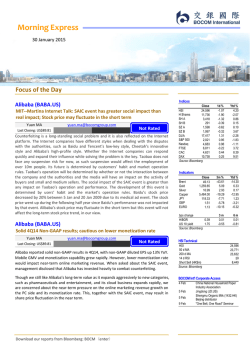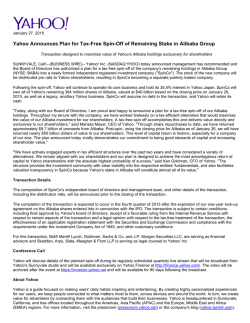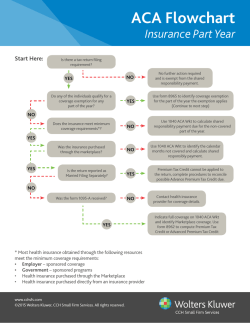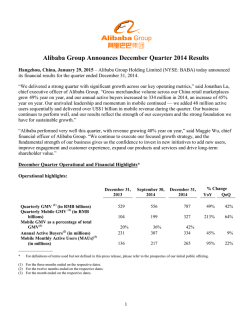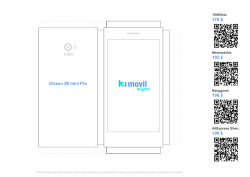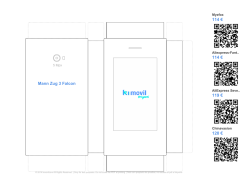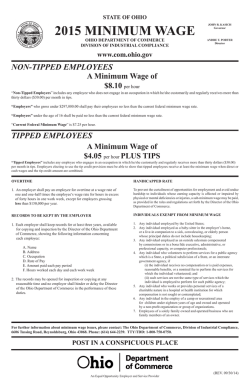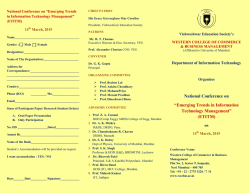
Joe Tsai Addressed Recent Interaction with SAIC
Joe Tsai Addressed Recent Interaction with SAIC Hong Kong, January 29, 2015 - Alibaba Group’s Executive Vice Chairman Joe Tsai addressed reports concerning the recent interaction between China’s State Administration of Industry and Commerce and the company on Alibaba Group’s earnings conference call held earlier today. His relevant remarks from tonight’s call are as follows: Before I turn the call over to Maggie to go through the quarterly results, I want to address the news reports you may be seeing related to our interaction with the State Administration for Industry and Commerce, or SAIC, in China. Let me first say that Alibaba is a company with strong values. Nothing is more important to us than the trust we earned from our stakeholders, including our customers, business partners, regulators and shareholders. This trust is built on the expectation that everyone at Alibaba will act with absolute honesty and integrity, and to conduct our affairs with the highest standards of ethics and transparency. Our commitment to ethical and transparent behavior is why we were so deeply troubled by an SAIC report released on January 23 that purported to publish the results of a product sample check in online commerce. As we said before, we believe this report was flawed and was based on arbitrary methodology and we gave our views to the SAIC. Yesterday, a so-called “White Paper” was posted on the SAIC web site that specifically identified Alibaba and referred to a meeting between Alibaba and the regulators in July last year. We believe the flawed approach taken in the report, and the tactic of releasing a so-called “White Paper” specifically targeting us, was so unfair that we felt compelled to take the extraordinary step of preparing a formal complaint to the SAIC. I want to make sure you know the facts behind this so-called White Paper: No. 1, the first time we saw the White Paper was when it was posted on the SAIC web site yesterday; No. 2, like all international companies across the globe we from time to time meet with regulators in the normal course of business. The meeting last July was no different, and at this meeting we discussed working together to create a process to address key areas of consumer protection and orderly marketplace operations in online commerce; No. 3, today we observed that the SAIC has removed the White Paper from its web site; and Fourth, I want to make it absolutely clear that Alibaba has never requested the SAIC to delay the publication of any report. At Alibaba we believe in fairness. We support rigorous supervision of our company, but we also feel compelled to speak out when there are inaccurate and unfair attacks being leveled against us. The issues of counterfeiting and IP protections are a part of the problems in a growing economy today, whether it is online or offline. We have a zero tolerance policy towards counterfeits on our platform because the health and integrity of our marketplaces depend on consumer trust. To protect consumers, brand owners and legitimate sellers and to maintain the integrity of our marketplaces, we have a broad range of measures to prevent counterfeit and pirated goods from being offered and sold on our marketplaces. For example: We use data technology to analyze and track infringing products and identify hotspots for counterfeit distribution and sales; We work closely with Chinese public security, copyright, quality inspection, the intellectual property agencies to take the online fight against counterfeits to offline perpetrators; We conduct periodic checks by using third parties to identify suspected counterfeit products on our marketplaces; and We have established cooperative relationships with over 1,000 major brand owners and several industry associations in connection with intellectual property rights protection to enhance the effectiveness of our take-down procedures. When we receive complaints or allegations regarding infringement or counterfeit goods, we follow welldeveloped procedures to take swift action. If allegations of posting or selling counterfeit products are substantiated, we penalize the parties involved through a number of means including: enforcing the seller to reimburse the buyer; assessing penalties against the seller or limiting their ability to add listings; adopting a “name and shame” policy; and closing down storefronts and permanently banning the seller from establishing another storefront, and in the case of Tmall.com sellers, confiscating the consumer protection security deposits paid. These policies and procedures are tough and we work very hard to enforce them. In addition, we are devoting more resources to the fight against fakes. For the past two years, Alibaba invested over 1 billion Renminbi in the fight against counterfeiting and to enhance consumer protections. In addition, we have a special task force of thousands of employees who are focused on the urgent fight against counterfeiting, and we have just announced we are adding 300 more people. Our efforts of taking the online fight to offline perpetrators are yielding results. Last year, Alibaba cooperated with Chinese law enforcement agencies in over 1,000 counterfeiting cases. As a result of this collaboration, 400 suspects from 18 counterfeiting rings were arrested while 200 brick and mortar stores, factories or warehouses involved in production and selling of counterfeits were closed. When you step back and look at our overall efforts to combat illicit activities, our track record is clear. We are certainly not perfect, and we have a lot of hard work ahead of us. In the global e-commerce marketplace there will always be people who seek to conduct illicit activities, and like all global companies in our industry, we must continue to do everything we can to stop these activities. We take these issues seriously because we are an organization built on the value of integrity. We also take these issues seriously because we are also victims of counterfeiting. Our entire success as a company is built on the idea that customers can come to our platforms and have trust in the quality of the products they purchase. And customers clearly continue to give us their votes of confidence, especially when you consider the 334 million annual active buyers and 45% year-on-year growth in active buyers we reported today. About Alibaba Group: Alibaba Group’s mission is to make it easy to do business anywhere. The company is the largest online and mobile commerce company in the world in terms of gross merchandise volume. Founded in 1999, the company provides the fundamental technology infrastructure and marketing reach to help businesses leverage the power of the Internet to establish an online presence and conduct commerce with hundreds of millions of consumers and other businesses. Alibaba Group’s major businesses include: Taobao Marketplace (www.taobao.com), China's largest online shopping destination Tmall.com (www.tmall.com), China’s largest third-party platform for brands and retailers Juhuasuan (www.juhuasuan.com), China’s most popular online group buying marketplace Alitrip (www.alitrip.com), a leading online travel booking platform AliExpress (www.aliexpress.com), a global online marketplace for consumers to buy directly from China Alibaba.com (www.alibaba.com), China’s largest global online wholesale platform for small businesses 1688.com (www.1688.com), a leading online wholesale marketplace in China Alibaba Cloud Computing (www.aliyun.com), a provider of cloud computing services to businesses and entrepreneurs Alibaba Group also provides payment services on its marketplaces through its contractual arrangements with Ant Financial Services Group, a related company of Alibaba Group that operates Alipay (www.alipay.com). Through China Smart Logistics (or Zhejiang Cainiao Supply Chain Management Co., Ltd.), a 48%-owned affiliate, Alibaba Group operates a central logistics information system that connects a network of express delivery companies in China. Media contacts: Bob Christie, Alibaba Group [email protected] + 1 917 860 9410 Melanie Lee, Alibaba Group [email protected] +852 9845 5416
© Copyright 2026

